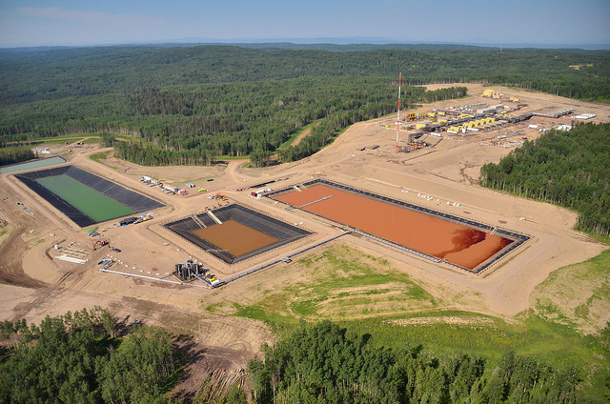The royalty system B.C. uses to collect revenue from the oil and gas industry is “broken,” according to a report commissioned by the province.
The Ministry of Energy, Mines and Low Carbon Innovation released a comprehensive review of the province's royalty systems last week. It found the regime is unnecessarily complicated and almost 30 years old.
The report kicks off an “overhaul of the current system that eliminates outdated, inefficient fossil-fuel subsidies and ensures British Columbians get a fair return on our resources,” said Energy Minister Bruce Ralston in a statement. The BC NDP pledged to review the royalty system as part of their 2020 campaign.
Sven Biggs, Canadian oil and gas program director for Stand.earth, said the report could mean large oil and gas companies are about to start paying a lot more money to the province to pull fossil fuels out of the ground.
The report lays out how the existing royalty structure isn't working, which is something even the oil and gas industry is starting to acknowledge, Biggs said.
Royalty payments in B.C. are the second lowest in Canada, after Alberta's, he said. That’s the result of subsidies and tax credits given to the oil and gas industry to encourage development, while ignoring the low returns, he added.
“It's been successive governments asleep at the switch. They've layered new programs on top of the old programs, new subsidies on top of old subsidies, without really going back to assess what was already there,” Biggs says. “It's a mess that started back in the Gordon Campbell days. Then Christy Clark juiced up the subsidies and the NDP under John Horgan have mostly ignored the crisis until it's gotten big enough that they had to address it. All the while companies have gotten better at chasing subsidies.”
The report will now be used by government to come up with ways to overhaul the system. Government will present these ideas in November during a public consultation process.
There's two ways this could go, Biggs says.
First, government could take a stand against the oil and gas industry and raise royalty rates while creating a new system that helps B.C. work towards some of its larger societal goals, like reconciliation with Indigenous people, tackling climate change and fair returns on leased public resources, he says.
Or the report could be used to cut red tape for the industry and move the province towards a streamlined royalty system similar to the one in Alberta, Biggs says.
“Where the real fight is going to happen over the next month and a half is what do we replace the existing system with, and what do you do with the existing wells drilled under the old, broken system,” he says.
Alexandra Woodsworth, campaign manager with the environmental advocacy group DogwoodBC, says it's good to see the government following through on a campaign promise within the first year of its mandate, but that it took a lot of public pressure to get here.
“This is a real opportunity for the government to show it's serious on climate change,” she says. “If it just acts to cut red tape and not because of the climate crisis there'll be a lot of upset people demanding answers.”
Woodsworth says she hopes the overhaul will kill two of the “most egregious” subsidies and increase revenues to account for environmental damage caused by fossil fuels.
The Deep Well Royalty Credit program is first on her hit list.
The program was created in 2003 to offset the higher cost of drilling deep wells. As of March 2021 companies have accumulated $7.3 billion in credits, according to the report. Just over $3.6 billion have been claimed and companies have another $3.8 billion they can claim at a future date.
The Deep Well Royalty Credits is the province's biggest subsidy, Woodsworth says. Biggs notes it was brought in to encourage fracking, but as almost all gas in B.C. is now fracked the industry doesn't need encouragement to build more fracking wells.
Next Woodsworth recommends immediately getting rid of the Clean Growth Infrastructure Royalty program, which offers subsidies to companies trying to reduce their emissions.
“We shouldn't be paying oil and gas to clean up its own mess,” she says. “They know they need to clean their industry up and they have the money to do so. We don't need to be using the public purse.” Government can regulate the industry to reduce its emissions instead, she says.
Part of overhauling B.C.'s royalty system needs to include public education, Woodsworth says. A recent poll done for DogwoodBC by Insights West found only seven per cent of British Columbians supported fossil fuel subsidies — and only 18 per cent knew fossil fuel subsidies were on the rise in B.C.
“When people pay their taxes they think it goes towards schools and public health,” Woodsworth says. “Ordinary folks don't expect that one of the wealthiest industries in the world are getting handouts from their tax dollars.”
Subsidies given to B.C.'s oil and gas industry are on the rise.
A June Stand.earth report found B.C. gave away $1.3 billion in fossil fuel subsidies during 2020–2021 and predicted subsidies would rise to $1.8 billion in the next three years. In contrast, the province spent $1.1 billion on reducing greenhouse gas emissions.
The government of B.C. says its subsidies are less than $1.3 billion because it does not consider programs that encourage industry to reduce its emissions as subsidies.
During the election the federal government said it would end all fossil fuel subsidies by 2025.
Biggs says one way or another, he thinks royalties are going up in B.C.
“Whether or not that's a fair slice of the pie is another question, and whether or not the royalty structure they bring in meets the province's other, broader goals on climate, reconciliation, environmental degradation of the Peace region — those are the big outstanding questions.” ![]()
Read more: Energy, BC Politics, Environment

















Tyee Commenting Guidelines
Comments that violate guidelines risk being deleted, and violations may result in a temporary or permanent user ban. Maintain the spirit of good conversation to stay in the discussion.
*Please note The Tyee is not a forum for spreading misinformation about COVID-19, denying its existence or minimizing its risk to public health.
Do:
Do not: